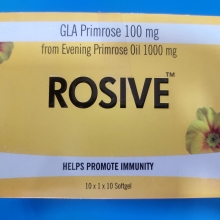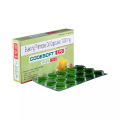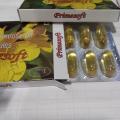Home / Categories / ROSIVE CAPSULE

ROSIVE CAPSULE
EVENING PRIMROSE OIL-1000MG CAP.
DIETARY SUPPLEMENTS-AMINO ACIDS
SWEVEN ENTERPRISES
Product Details
Scientific Name: Oenothera biennis
Common Names: Oil of evening primrose, king’scureall, night willow herb, fever plant, scabish, and sun drop.
Description of Active Ingredients:
Evening primrose is native plant of North America. It is a hardy plant that survives most soils and conditions. The evening primrose seed contains the active ingredients used in preparations. The seed contains a variety of amino acids. Some of these amino acids include lysine, proline, aspartic acid, tyrosine, phenylalanine, histidine, glycine, leucine, arginine, methionine, alanine, glutamic acid, tryptophan, and serine.The oil contained within the seeds contains mostly cis-GLA and cis-linoleic acid. Other active ingredients found within the seed in smaller amounts include campesterol, palmitic and oleic acid, beta-sitosterol, and atrienoic acid.
Mechanism of Action:
The active ingredient contained in evening primrose has one of the highest sources of gamma-linolenic acid(GLA). This essential fatty acid is found in many areas of the body. These areas include breast milk, brain, and are the active part of polyunsaturated fats. Evening primrose is thought to replace essential fatty acids that are decreased in many symptoms and disease states such as premenstrual syndrome, mastalgia, benign prostatic hypertropy, atopic dermatits, and rheumatoid arthritis.
Current Indications and Efficacy:
Evening primrose has several indications:
Atopic dermatitis: This has been shown to be efficacious due to providing essential fatty acids needed for the production of anti-inflammatory prostaglandins.8 One study involved patients receiving 500mg evening primrose oil twice daily for three weeks. The results of this study showed improvement for many symptoms. These symptoms included itch, disease severity, scaling, dryness, percent of body involved, erythema and surface damage.
Cholesterol levels and arteriosclerosis: GLA has been proven to decrease cholesterol levels by 31% in patients receiving 4g/day for three months. In a placebo control study 79 patients were administered 4g/day evening primrose. After three months of therapy there was a 31% (p<0.001) decrease in serumcholesterol. The placebo group had a nonsignificant reduction.
Rheumatoid arthritis: Evening primrose helps to control pain and inflammation associated with rheumatoid arthritis. Again, it provides the essential fatty acids required for the production of anti-inflammatory prostaglandins. One study looked at antioxidants and fatty acids in the amelioration of rheumatoid arthritis and related disorders. Patients were exposed to evening primrose oil 540mg/d or GLA 450mg/d. After twelve months of therapy both groups showed improvement in their symptoms and reduced requirement for nsaid use.
Mastalgia: It is suggested that women who suffer from mastalgia may be unable to convert LA to GLA.There have been positive results using evening primrose in the treatment of mastalgia. One study looked at non-cyclical and cyclical mastalgia. They treated patients with evening primrose 500mg/d for three months. After therapy for three months, patients with non-cyclical mastalgia had a response rate of 44%. Cyclical mastalgia had a response rate of 45%. The results of this study indicated that evening primrose oil is the most promising first line treatment of mastalgia for women under 25.115.
Benign prostatic hypertrophy: Evening primrose has been thought to have alpha-1-antagonist properties.There is little evidence to support the efficacy of this action. Symptoms of pre-menstrual syndrome (PMS). These symptoms include headache, bloating due to fluid retention, mood swings, and breast tenderness. It is thought that symptoms of PMS are caused by a decrease in levels of GLA.
Contraindications/Allergies
Contraindications include: epilepsy or seizure disorder, schizophrenia. Evening primrose may cause seizures in schizophrenic patients. Caution should be used in pregnancy or breast-feeding patients. Patients should consult their physician prior to taking evening primrose if they have any other medical conditions or allergies (especially plant allergies).These plant allergies are not well defined. Evening primrose my not be recommended in breast-feeding. There are no studies to show whether evening primrose will harm a nursing infant.
Dosage forms/Recommended Doses/Duration:
Common dosage forms of evening primrose include capsules and oil.
- Recommend dose up to two 1,300mg capsules daily.
- Recommended oil dose is 2-3grams daily. Maximum daily dose is approximately 4grams. Duration of therapy is based upon symptoms and disease state.
Drug interactions and Drug-Disease interactions:
Drug interactions include anticoagulants, blood pressure medications, epileptogenic drugs for schizophrenia. Drug-disease interactions include schizoprenia. Evening primrose may precipitate seizures in these patients.
Other safety issues:
Evening primrose is well tolerated by most patients. However, common side effects may include bloating, nausea, diarrhea, vomiting, and gas. As with any medication, consult your physician or pharmacist prior to beginning therapy with evening primrose. Keep all medication out of the reach of children.
Source:Drug Pharmacoepia


